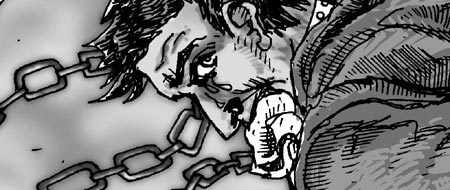
I don’t care who you are, you only get a couple of drop-dead gorgeous stories, no matter how long you write. A couple, maybe three, that just sing, that last, that are permanent, that are indelible. Even Flannery O’Connor, even Tobias Wolff, even Stephen King. The rest can be beautiful and chiseled and have impact, do everything right, and you’ve got to keep trying to do it again, just one more time, trade whatever parts of yourself you need to get the words down right, but still — it’s like you’re a kid down at the diamond, at the plate, and just once over the course of that whole magic summer you really come up under that ball, send it out past where anybody else has, and you kind of just look at the bat afterwards. At your hands.
One of the ones Joe R. Lansdale’s hit deep into legend is “The Night They Missed the Horror Show.” I didn’t read it when it won its Stoker in 1988 — I was sixteen, though, and it would have changed me, would have had me right in its sights — don’t think I found it until about a decade later, even, probably in one of its many reprints. Then, coming back from WHC2011 a couple of weeks ago, going cover-to-cover with their stand-out souvenir book (check Tom Piccirilli’s Brian Keene write-up, for one, or the Joe Hill), I lucked onto “The Night They Missed the Horror Show” again, with its dedication to Lew Shiner, as a story that doesn’t flinch, and I shrugged, dove back in. Lansdale’s never let me down on the page before, and this would be a nice little reunion with a story I hadn’t hit in probably ten years. Too, in those ten years, I’d read so much Jack Ketchum and Brian Evenson and Carlton Mellick III that I suspected my tolerances had shifted some, that I maybe had callouses on my eyes by now, and that, after writing a lot of horror, figuring out a little bit how it works, I’d maybe see a 1980s seam or two this time around, midst all the blood and gore. Maybe catch a flinch.
Wrong.
And I’ve read it again, just in prep for this write-up, put my professor hat on and everything, and, man, what I want to say about the story, what I want to draw your attention to, so you can write better — so fiction can be better — is the way Lansdale escalates in “The Night They Missed the Horror Show,” and the way each escalation takes the last escalation apart, so that we don’t end up at some screechy, preachy precipice that we have to contrive our way back from. Or I want to talk about the tricks he’s using to get us to identify with this main character and thus engage the story so deeply that we invest ourselves in it, and thus become vulnerable to it, and feel not just betrayal at how all our expectations are so expertly undermined, but a very palpable kind of shame. Or I really want to talk about the distractions he’s throwing up, the dead dogs and snuff films and casual violence, all stuff that takes our focus away from what he’s really doing — a very Vonnegut trick. And I want to get you to look at how he makes this small town Friday night come alive so effortlessly, or how, reading this, you fall under the spell of suspecting that this is all just thinly disguised, actually-lived stuff, which serves to break down your critical barriers, allows the fiction to leach in. And I want to have you pay attention to how the prose, the writing, it never even once gets in the way of the story, is always honest to Leonard’s diction, even though Lansdale can make the language do whatever he wants, and I want you to see how just one throwaway comment about gravel can be the core of a story, and I want to just have you start with the title, how it’s saying the exact opposite of itself, and how, even with me telling you that, I’m not ruining anything. How, once you read that hook of an opening line — “If they’d gone to the drive-in like they’d planned, none of this would have happened” — and cue into how the story’s positioning itself, the promises it’s making, you can’t stop reading.
But what it all comes down to, really, it’s what Lansdale already says to Lew Shiner, up front: this is a story that doesn’t flinch. I can’t say it any better than that. All I can say to you’s just to read it, and then try not to think about it, and try not to keep thinking about it when you find yourself drifting back to it anyway. It’s a story that’s arcing way up over the diamond, over all the magical summers, and when it comes down it comes down hard, and the world’s a different place, and you’re a different person in it. We should all swing so hard.

 is the NYT bestselling author of 30 or so books, +350 stories, some comic books, and all this stuff here. He lives in Boulder, Colorado, and has a few broken-down old trucks, one PhD, and way too many boots. More
is the NYT bestselling author of 30 or so books, +350 stories, some comic books, and all this stuff here. He lives in Boulder, Colorado, and has a few broken-down old trucks, one PhD, and way too many boots. More